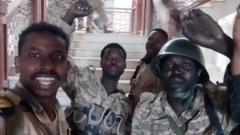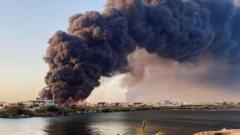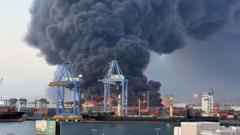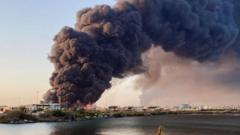As the conflict drags on, the recapture of the presidential palace in Khartoum symbolizes a potential turning point in Sudan's bitter civil war, yet humanitarian challenges persist.
**Sudan Army Seizes Presidential Palace, Sparking Hopes and Fears in Ongoing Conflict**

**Sudan Army Seizes Presidential Palace, Sparking Hopes and Fears in Ongoing Conflict**
The Sudanese Armed Forces reclaim control of the presidential palace, but the broader implications for peace remain uncertain.
Sudanese Armed Forces (SAF) marked a notable turning point in their ongoing conflict with the paramilitary Rapid Support Forces (RSF) by regaining control of the presidential palace in Khartoum. Soldiers celebrated in the streets, reflecting a significant military gain in a war that has raged for two years. The SAF initially lost control of the capital early in the armed confrontation and has been striving to reclaim it.
The presidential palace, viewed as both a historic symbol and a power center, is critical for the military's assertion of legitimacy in the fight against what they label a “terrorist militia.” Following the recent offensive, the army has successfully cleared numerous districts within greater Khartoum, effectively pushing the RSF from strategic locations, such as government offices and military headquarters, as confirmed by an army spokesperson.
However, while the RSF's influence appears diminished, skirmishes are anticipated as forces remain embedded in various parts of Khartoum, including the airport. The fighting may escalate, with the RSF recently launching a drone strike that resulted in casualties among journalists and army officials. The implications of this latest military gain could reshape the trajectory of the conflict, potentially leading to a consolidation of the SAF's control in central Sudan and increased aggression towards the RSF’s primary territory in Darfur.
The two leaders at odds, General Abdel Fattah al-Burhan of the SAF and General Mohamed Hamdan Dagalo, known as Hemedti from the RSF, had previously collaborated in a coup before their alliance fractured into a violent struggle. While SAF’s control of Khartoum might provide them with leverage in ongoing territorial disputes, analysts caution that the country could be on the brink of a de facto division, with both factions digging into their respective strongholds.
The humanitarian impact of the conflict has been catastrophic, with the UN declaring the situation in Sudan as the world's gravest humanitarian crisis. Over 12 million people have been displaced, and chronic food shortages plague the nation, further exacerbated by RSF looting and governmental restrictions on aid distribution. Consequently, though the recapture of the palace may alter power dynamics, many Sudanese civilians face grim prospects regardless of these military shifts.
As the situation unfolds, the SAF hopes to capitalize on this victory but analysts have expressed skepticism over any party's capacity to reunify Sudan effectively. Both factions have continually refused ceasefire proposals, indicating that the struggle for control is far from over.
The presidential palace, viewed as both a historic symbol and a power center, is critical for the military's assertion of legitimacy in the fight against what they label a “terrorist militia.” Following the recent offensive, the army has successfully cleared numerous districts within greater Khartoum, effectively pushing the RSF from strategic locations, such as government offices and military headquarters, as confirmed by an army spokesperson.
However, while the RSF's influence appears diminished, skirmishes are anticipated as forces remain embedded in various parts of Khartoum, including the airport. The fighting may escalate, with the RSF recently launching a drone strike that resulted in casualties among journalists and army officials. The implications of this latest military gain could reshape the trajectory of the conflict, potentially leading to a consolidation of the SAF's control in central Sudan and increased aggression towards the RSF’s primary territory in Darfur.
The two leaders at odds, General Abdel Fattah al-Burhan of the SAF and General Mohamed Hamdan Dagalo, known as Hemedti from the RSF, had previously collaborated in a coup before their alliance fractured into a violent struggle. While SAF’s control of Khartoum might provide them with leverage in ongoing territorial disputes, analysts caution that the country could be on the brink of a de facto division, with both factions digging into their respective strongholds.
The humanitarian impact of the conflict has been catastrophic, with the UN declaring the situation in Sudan as the world's gravest humanitarian crisis. Over 12 million people have been displaced, and chronic food shortages plague the nation, further exacerbated by RSF looting and governmental restrictions on aid distribution. Consequently, though the recapture of the palace may alter power dynamics, many Sudanese civilians face grim prospects regardless of these military shifts.
As the situation unfolds, the SAF hopes to capitalize on this victory but analysts have expressed skepticism over any party's capacity to reunify Sudan effectively. Both factions have continually refused ceasefire proposals, indicating that the struggle for control is far from over.




















